Sewer Line Cleaning Services by Litteken Plumbing
A properly functioning sewer line is essential to the health and comfort of any home or business. When a clog or buildup disrupts your sewer system, the effects can range from slow drains and foul odors to dangerous backups and costly property damage. At Litteken Plumbing, we specialize in professional sewer line cleaning services that restore proper flow and help prevent future issues—keeping your plumbing system working safely and efficiently.
With over 25 years of experience serving homeowners and businesses throughout the St. Louis Metro East region, Litteken Plumbing brings trusted expertise, industry-leading tools, and personalized customer service to every job. Whether you’re dealing with a recurring blockage or need a one-time cleaning, our team is here to help.
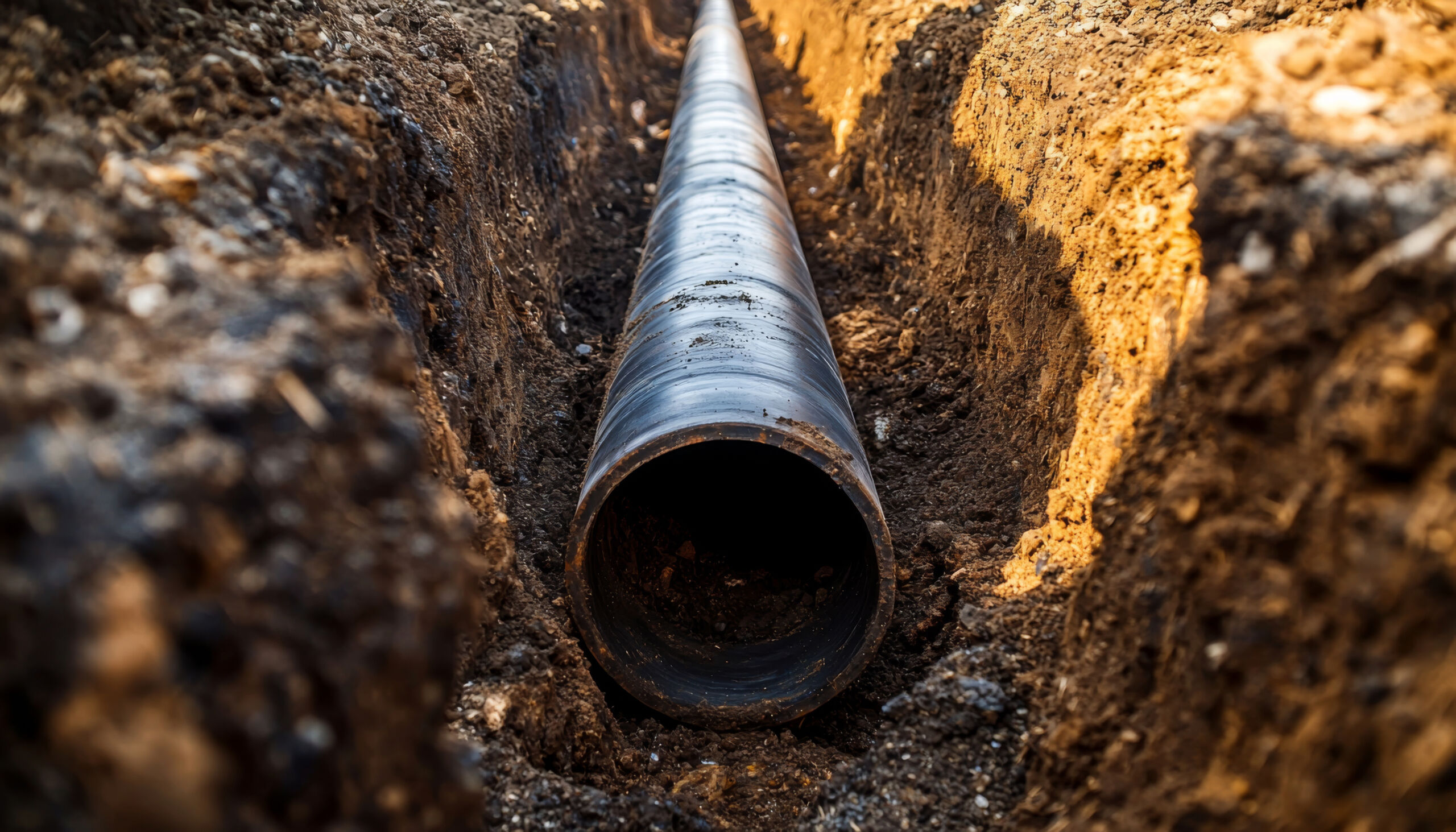
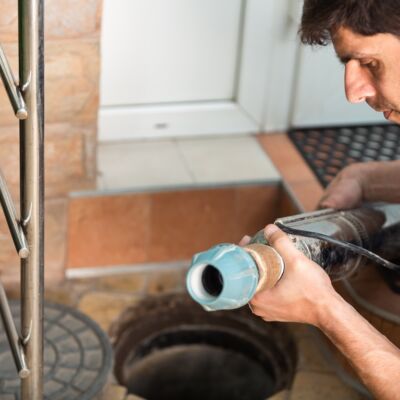
Signs You May Need Sewer Line Cleaning
Not sure if your sewer line needs attention? Here are some common warning signs:
- Slow drains throughout the house
- Frequent toilet clogs or gurgling sounds
- Water backing up into sinks, tubs, or toilets
- Unpleasant odors coming from drains
- Soggy patches or foul smells in your yard
If you’re experiencing any of these issues, it’s time to contact a licensed plumber for a thorough inspection and cleaning.
Our Sewer Line Cleaning Process
Step 1: Video Camera Inspection – We begin by using a high-resolution sewer camera to inspect the inside of your pipes. This allows us to pinpoint the exact location and cause of the problem—whether it’s tree roots, a collapsed section, or buildup.
Step 2: High-Pressure Water Jetting – When appropriate, we use hydro jetting to blast away years of grease, sediment, and debris using powerful, pressurized water. This technique is safe for most sewer lines and extremely effective at clearing blockages and cleaning pipe walls.
Step 3: Mechanical Augers and Drain Snakes – In some cases, traditional cable machines are used to break through stubborn obstructions, especially solid waste or invasive roots.
Step 4: Post-Cleaning Inspection – Once the sewer line is cleared, we perform a follow-up inspection to ensure your system is fully restored and functioning properly.
Common Problems Solved
Tree Root Intrusions
Roots from nearby trees can infiltrate older or cracked pipes, blocking flow and causing damage.
Grease and Fat Buildup
Pouring grease down your kitchen sink can lead to thick deposits that harden and restrict flow.
Non-Flushable Items
Baby wipes, feminine hygiene products, and paper towels should never be flushed—they don’t break down like toilet paper.
Pipe Scale and Sediment
Over time, mineral deposits and buildup can reduce your pipe’s internal diameter.
Collapsed or Broken Pipes
Older sewer lines made from clay or cast iron may deteriorate and collapse.
Sewer Line Cleaning vs. Sewer Line Replacement
While cleaning is often sufficient for clogs and buildup, more severe issues like a collapsed pipe or extensive root infiltration may require sewer line replacement. At Litteken Plumbing, we provide honest recommendations after inspection and will walk you through your options with no pressure.
If cleaning can fix the problem, we’ll handle it efficiently. If not, our team can provide expert replacement services, including trenchless methods like CIPP installation where applicable.
Preventative Maintenance for Sewer Lines
Regular maintenance is the best way to avoid costly sewer line emergencies. Litteken Plumbing offers scheduled cleaning and inspections for both residential and commercial properties.
Maintenance Tips to Keep Your Sewer Line Clear:
- Use drain screens to prevent food, hair, and debris from entering drains
- Avoid pouring grease or oil down the sink
- Flush drains with hot water once a week to loosen residue
- Install a backwater valve to prevent sewer backups in flood-prone areas
- Have annual camera inspections to detect early warning signs before they become major issues
- Keep trees and shrubs away from sewer lines to reduce the risk of root intrusion
Benefits of preventative sewer line cleaning include:
- Reduced risk of clogs and backups
- Longer lifespan for your plumbing system
- Peace of mind knowing your drains are flowing freely
Ask us about setting up a maintenance schedule tailored to your property’s needs.
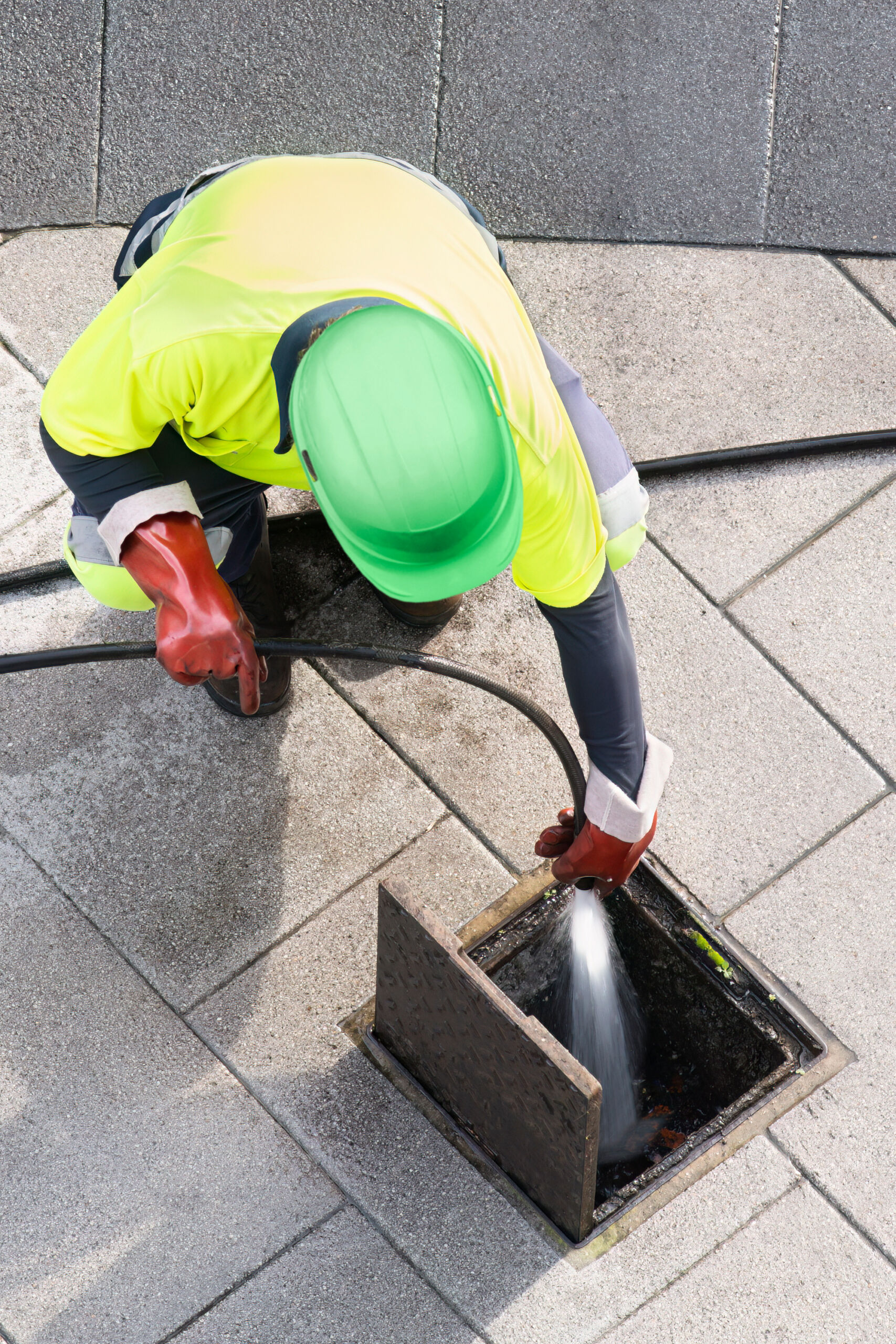
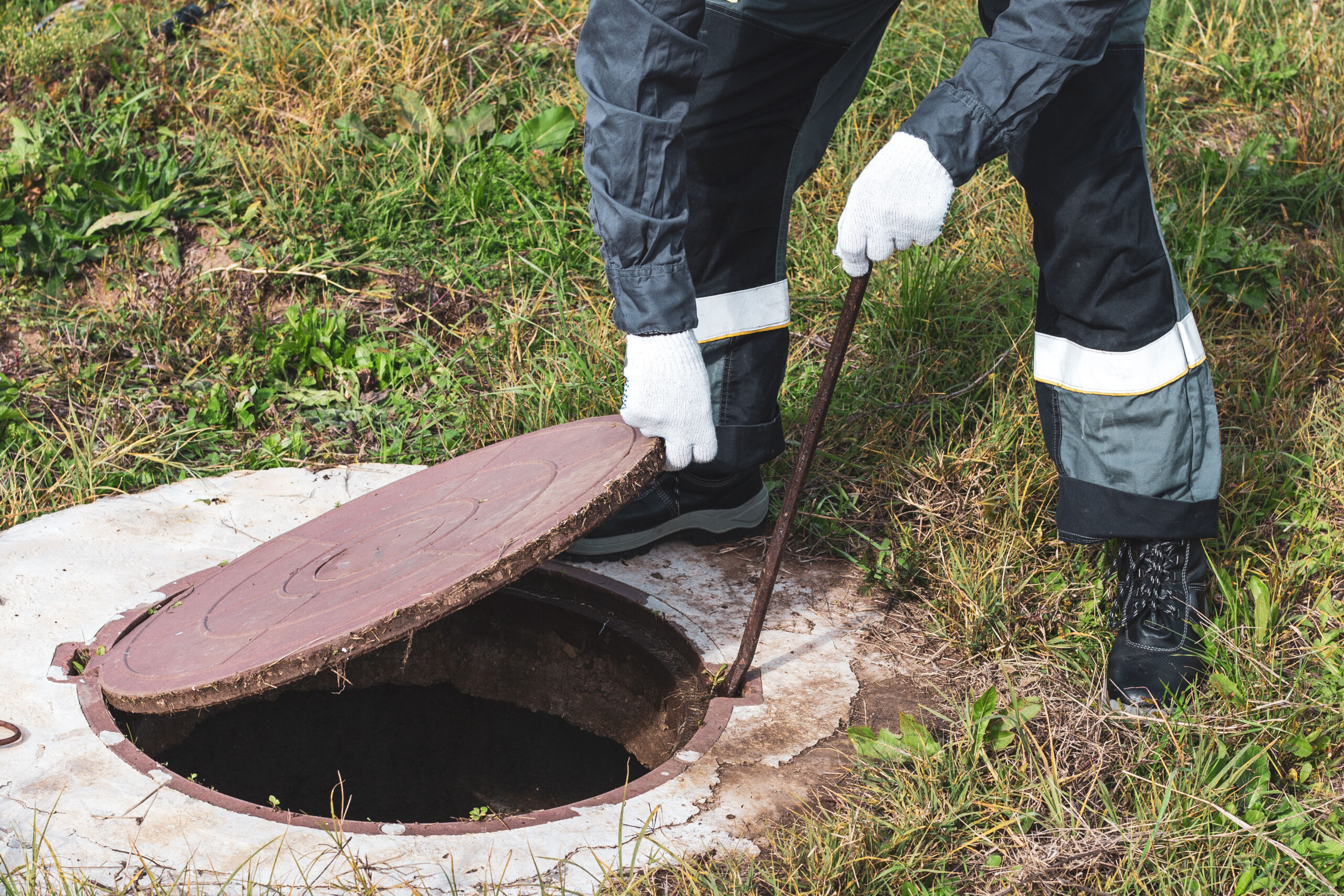
Types of Sewer Systems
1. Municipal Sewer Systems
These are public systems managed by a city or local government. Wastewater from your property flows through a private sewer lateral into a main municipal line. Homeowners are typically responsible for the section that runs from the house to the connection at the street.
2. Septic Systems
In rural or outlying areas without access to a public sewer system, properties often rely on septic systems. Wastewater flows from the building into a septic tank, where solids settle and the remaining water is filtered into a drain field.
While both systems require proper maintenance, sewer line cleaning for a municipal connection focuses on keeping the lateral pipe clear, while septic system maintenance involves tank pumping and field inspection.
Our technicians are trained to handle cleaning and maintenance on both types of systems and can help identify what’s in place at your property.
Residential & Commercial Sewer Line Cleaning
Whether you’re a homeowner dealing with a stubborn clog or a business managing a larger sewer system, Litteken Plumbing offers solutions to fit your property:
Residential Sewer Cleaning Services:
Single-family homes
Multi-family units
Rental properties
Commercial Sewer Cleaning Services:
Restaurants & food service facilities
Retail stores & office buildings
Schools & municipal buildings
Industrial facilities
Why Choose Litteken Plumbing?
We understand that plumbing problems can be stressful. That’s why we provide:
- Experienced, licensed plumbers with decades of combined experience
- Advanced diagnostic tools for accurate problem identification
- Transparent pricing with no surprises
- Fast, friendly service with minimal disruption to your day
We’re proud to serve communities across the Metro East, including Highland, Bethalto, Lebanon, Carlyle, and surrounding areas.
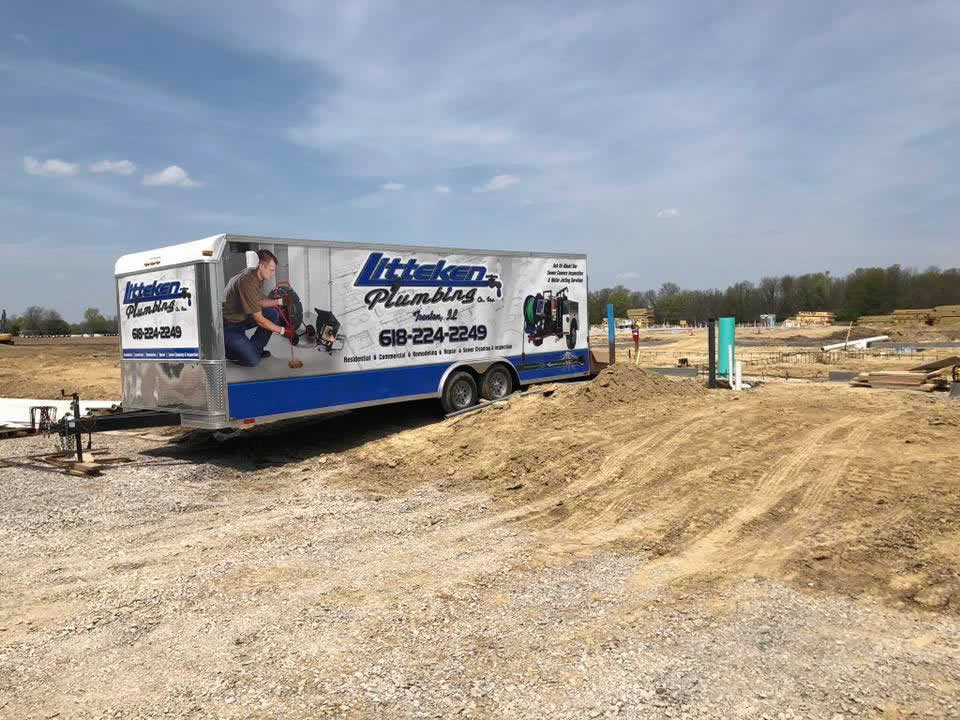
Frequently Asked Questions About Sewer Line Cleaning
Most homes benefit from sewer line cleaning every 1–2 years, especially if you’ve had issues in the past or live in an older home.
While small clogs can sometimes be cleared with a plunger or drain snake, professional equipment is needed for full sewer line cleaning. DIY methods may damage your pipes or provide only a temporary fix.
Coverage depends on your policy and the cause of the blockage. It’s best to review your insurance documents or speak with your provider.
Drain cleaning typically refers to clearing individual lines inside your home, while sewer line cleaning focuses on the main line that connects your property to the municipal system.
Most residential sewer line cleaning jobs can be completed in a few hours, though timing may vary depending on the extent of the blockage.
Yes—if the slow drains are caused by a blockage in the main sewer line, cleaning will typically restore full flow to all drains.
Yes—when performed by professionals using the appropriate method, cleaning is safe and can even help preserve older piping.
Tree roots, grease buildup, and improper disposal of waste like wipes or hygiene products are leading causes of recurring clogs.
If you’re unsure, check your water bill—if you’re paying sewer fees, you’re likely connected to a municipal system. Otherwise, you likely have a septic tank.
Absolutely. We have the equipment and expertise to handle sewer line cleaning for large-scale systems and industrial facilities.
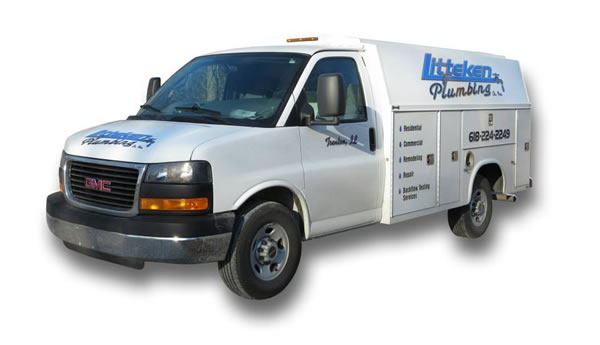
Local Regulations & Homeowner Responsibilities
In many Metro East communities, homeowners are responsible for maintaining the sewer lateral that connects their home to the municipal main. That means any blockage, backup, or damage occurring within your property’s sewer line is typically your responsibility.
Some municipalities have specific regulations for sewer cleanouts, backflow prevention devices, and allowable discharge types. Homeowners may be required to:
- Maintain accessible sewer cleanouts
- Install or maintain backwater valves in flood-prone areas
- Ensure proper connection to city sewer systems
At Litteken Plumbing, we stay up to date on local codes so you don’t have to. We ensure every job is compliant with city regulations and help guide you through any permitting or inspection requirements.
Schedule Your Sewer Line Cleaning Today
Don’t wait for a messy backup to take action. If you’re noticing slow drains, unusual odors, or repeated clogs, it’s time to schedule a professional sewer line cleaning.
Litteken Plumbing is here to restore your system and give you peace of mind with expert service you can trust. Call today to speak with one of our experienced team members and schedule your inspection or cleaning service.
